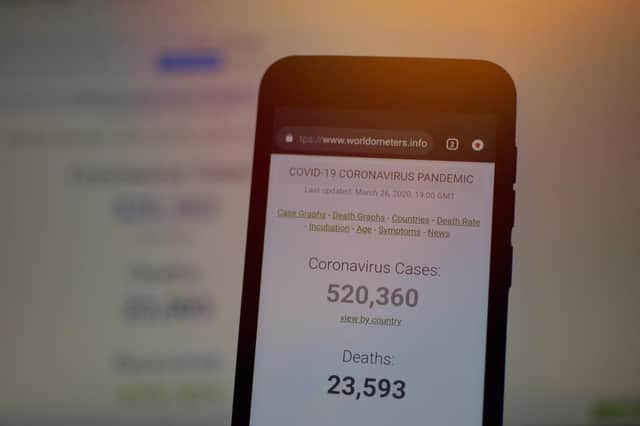Coronavirus Worldometer: the data site that gives latest update on Covid-19 death toll explained - and if it’s reliable


You likely remember it as the website that displays a live count of the world’s population, with births ticking up in real time as deaths morbidly balance out the numbers.
But in recent weeks, the site – now one of the biggest on the internet – has taken on a slightly different mantle.
Advertisement
Hide AdAdvertisement
Hide AdIn the age of coronavirus, the website now displays highly detailed statistics on just about every facet of the disease’s spread, from individual countries’ death tolls to the number of active cases in certain regions.
Its prominence is such that Worldometer is now regularly quoted in official government press briefings. But where does its data come from?
Here’s everything you need to know:
What is Worldometer?
Worldometer has humble beginnings that date back to 2004, when teenage programmer Andrey Alimetov created the first iteration of the site before his 20th birthday.
It was a simple project (Alimetov told New Scientist it “took only about two to three days to make”) using basic programming and your computer’s clock to generate a live count of the world's population.
Alimetov sold the website in $2000 a year later (“it was a lot of money), and now the site is owned by American-based Dadax LLC.
Worldometer – which generates its revenue through advertising – has grown exponentially over the years, and now covers subjects as diverse as world population, government, economics, society, media, environment, food, water, energy, and health.
Why has it come to prominence?
Worldometer always provided interesting statistics, but for many served as nothing more as an internet curio for many years.
But in recent months, its figures have been cited in official government press briefings from across the world, including those by the UK Government, who regularly used Worldometer figures for a global comparison of Covid-19 deaths at their daily press conferences.
Advertisement
Hide AdAdvertisement
Hide AdThat exposure has seen the website’s search engine ranking improve dramatically.
Can it be trusted?
At a moment in time during which information and facts are of utmost importantance, why has it fallen to a single website to be trusted with the coronavirus numbers?
In short: why Worldometer?
Nobody is really sure, and many who have worked with Worldometer’s data in the past while covering Covid-19 do not – for the most part – do so anymore.
Max Roser, a researcher at Oxford University and founder of Our World In Data, told New Scientist that Worldometer regularly “wastes so much of my and my team’s time.”
“We get messages of people asking why do we not show this or that – ‘Worldometer has the data’,” he said. “Too often when you look into it, they provide no source or it is wrong.”
That unreliability, and Worldometer’s anonymous team of analysts with little to no accountability, led to even Wikipedia’s editors refusal to permit the use of Worldometer as a reliable source on coronavirus-related pages.
So should you trust Worldometer’s figures? If you’re a government official, academic or other high-ranking expert working to further understand the coronavirus outbreak, probably not.
For most of us, the site provides an interesting – if not totally accurate – insight into the world’s population, but take it with a pinch of salt.
Advertisement
Hide AdAdvertisement
Hide AdAnd that’s before you take into account the website's problems with security earlier this year, when hackers were able to alter Worldometer’s statistics to show a dramatic rise in COVID-19 cases in Vatican City, causing panic among social media users.
Has the UK Government stopped using it?
The UK Government cited Worldometer figures at daily press conferences from 30 March to 14 April.
But a major flaw in Worldometer’s reporting of the figures was its failure to note the difference in forms of reporting processes between countries, meaning death counts were displayed with equal weight, even if they excluded care home deaths or other crucial information.
Comparisons between different countries were therefore flawed, and the Government quickly changed their source for figures to John Hopkins University (JHU).
A Cabinet Office spokesperson said: “Both Worldometer and John Hopkins provided comprehensive and well respected data. As the situation developed, we transferred from Worldometer to John Hopkins as John Hopkins relies more on official sources.”
